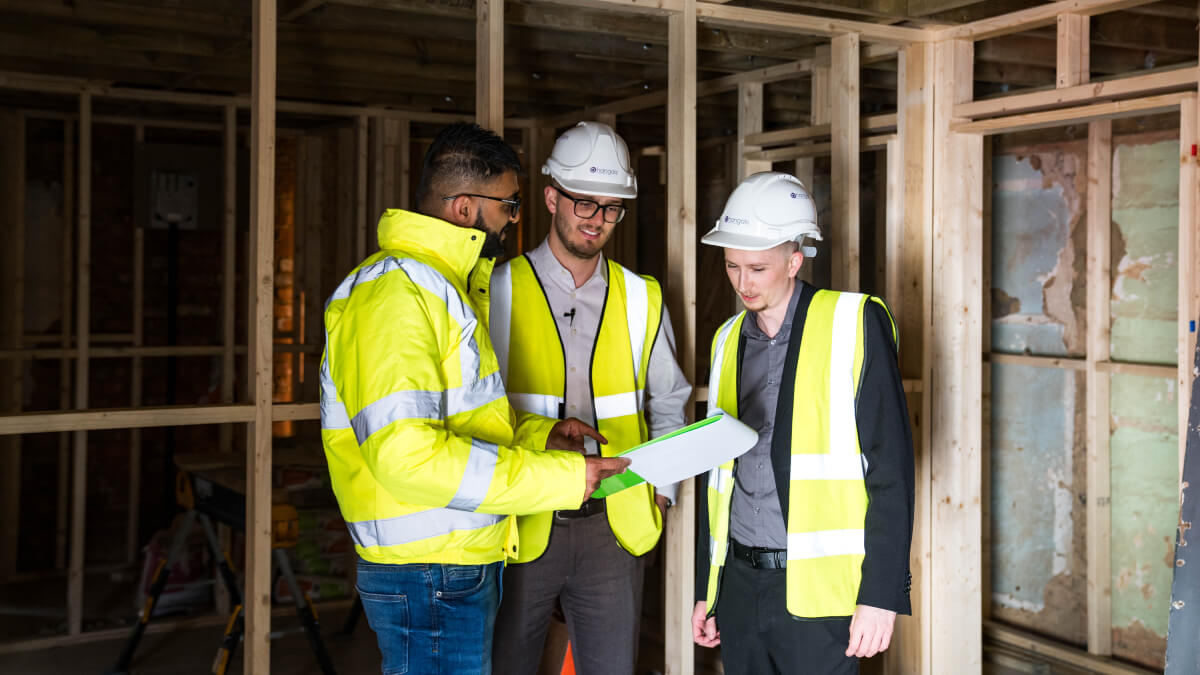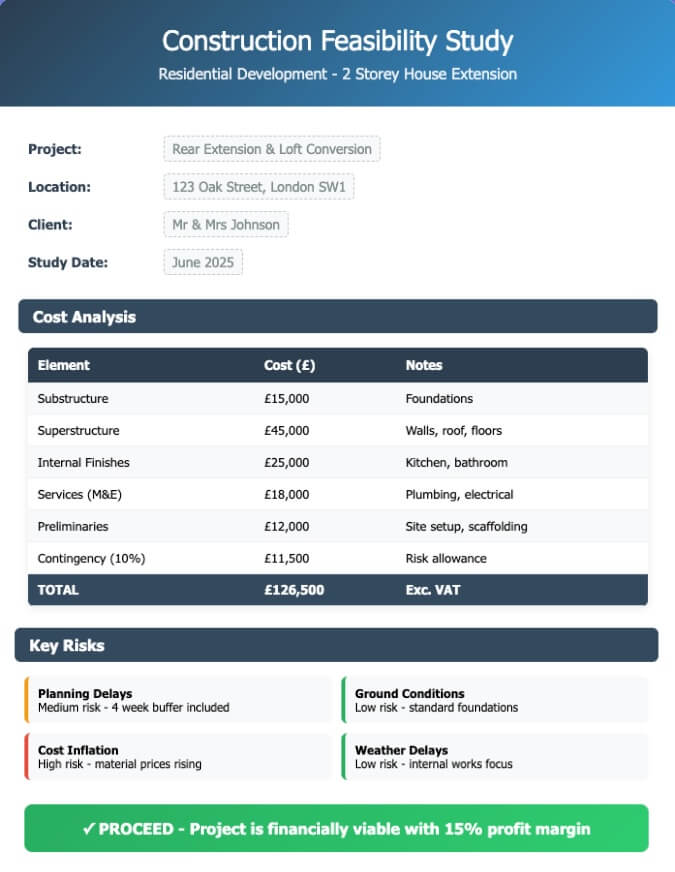At the start of any major construction project, it can be difficult to know what’s possible and what’s not. Whatever your construction experience, the early stages can feel overwhelming. Will the project be financially viable? Are there hidden technical challenges? Can we get planning permission? These crucial questions need answers before committing significant time and money to any build.
This is where feasibility studies come in, helping to break down complex projects into manageable assessments that give you confidence in a project’s viability from the very outset. At Bhangals, our experienced team are experts in feasibility studies and have helped countless clients get everything in order to start their projects on the right foot.
In this article, we’ll be using our expertise as quantity surveyors in London to answer the question: ‘What is a feasibility study?’ and explain how this essential tool can set your construction project up for success from day one.
Construction Guide: What Is A Feasibility Study
Construction is all about careful planning and informed decision-making. Feasibility studies make these two things a lot easier. This article will guide you through everything you need to know about feasibility studies in construction, explaining their purpose, benefits, and typical contents. Here’s what we’ll cover:
- What Is Meant By Feasibility Study?
- Benefits Of A Feasibility Study
- What Is In A Feasibility Study?
- Feasibility Study Template

What Is Meant By Feasibility Study?
A feasibility study in construction is a comprehensive analysis that evaluates whether a proposed building project is viable from a number of different perspectives, including technical, financial, legal, and practical. It helps you get a better understanding of your project before you dedicate significant time or money to it.
Unlike a simple cost plan or basic site survey, a feasibility study examines every aspect that could impact your project’s success. It considers things like soil conditions, planning constraints and market demand. The study provides an objective assessment that helps clients understand not just whether something can be built, but whether it should be built given all the circumstances involved.
Feasibility studies are typically used during the very early stages of project development, often before any of the detailed design work begins. They’re particularly valuable when clients are evaluating multiple options, assessing the potential of a site they’re considering purchasing, or trying to determine the best approach for their development. The process aligns closely with the Royal Institute of British Architects (RIBA) Plan of Work stages, typically occurring during Stage 0 (Strategic Definition) and Stage 1 (Preparation and Brief).

Benefits Of A Feasibility Study
Investing in a comprehensive feasibility study is one of the best ways to ensure the successful delivery of your project from the start. Here are just a few of the ways they could benefit you:
Risk Reduction & Early Problem Identification
Perhaps the most significant benefit is the early identification of potential project risks and obstacles. Feasibility studies uncover issues like contaminated land, restrictive planning policies, or challenging ground conditions before significant design fees are incurred. For example, discovering that a site falls within a conservation area early in the process allows for appropriate design responses and realistic timeline planning. The Building Research Establishment (BRE) research shows that addressing design issues early can reduce overall project costs by up to 20%.
Informed Financial Planning
Feasibility studies provide realistic cost estimates, allowing for accurate budgeting. Rather than relying on rough estimates or assumptions, clients receive detailed cost planning based on actual site conditions and project requirements. Not only does this level of accuracy improve project confidence, but it makes it easier to get approval for construction loans.
Our quantity surveying services in London regularly help clients present compelling feasibility cases to potential investors and lenders.
Enhanced Decision Making
With a comprehensive feasibility assessment, clients can make confident decisions about whether to proceed, modify their plans, or explore alternative options. The study might reveal that a three-storey extension isn’t viable due to planning constraints, but a two-storey option offers an excellent return on investment.
Streamlined Planning Applications
Feasibility studies often identify planning requirements and constraints early, allowing for more targeted and successful planning applications. The study might reveal that certain design approaches align better with local planning authority preferences, increasing approval chances significantly.
Timeline Optimisation
By identifying potential delays and complications early, feasibility studies enable more realistic project planning. They’ll help reveal things that might have caused lengthy delays and allow you to plan for them.

What Is In A Feasibility Study?
When done right, a feasibility study will contain enough sections to paint a clear picture of project viability. The specifics of this will vary from project to project, but these are some of the most common elements of any feasibility assessment:
Planning & Regulatory Review
A thorough examination of planning policies, local development plans, and regulatory requirements forms a crucial part of any feasibility study. The study also considers Building Regulations requirements and any specialist approvals that might be needed, such as environmental permits or highways agreements.
Technical Feasibility Assessment
This section evaluates the technical challenges and opportunities presented by the proposed development. Structural considerations are reviewed, particularly for refurbishment projects or challenging sites. Access arrangements for construction vehicles and ongoing use are assessed, along with parking provision and compliance with accessibility requirements under the Equality Act 2010.
Financial Viability Analysis
Perhaps the most critical section, this provides detailed cost planning and financial assessment. Construction costs are estimated based on current market rates and project-specific factors. Professional fees, planning costs, and statutory charges are included to provide a complete development budget.
Risk Assessment & Mitigation
A comprehensive review of project risks and appropriate mitigation strategies helps clients understand and manage potential challenges. This covers technical risks, such as ground conditions; commercial risks, including market changes, and regulatory risks, such as planning delays. Each risk is assessed for probability and impact, with specific mitigation measures recommended.
Programme & Delivery Strategy
The study outlines a realistic timeline for project delivery, from initial design through to practical completion. Key milestones are identified, including planning submission dates, construction start, and handover schedules. This section helps clients understand when they might see return on their investment and plan accordingly.
Market Analysis (For Commercial Projects)
For commercial developments, feasibility studies include analysis of local market conditions, comparable developments, and demand factors. This might involve reviewing recent sales or rental transactions, assessing competition, and understanding demographic trends that could impact demand.

Feasibility Study Template
To help you better understand how feasibility studies actually look and work, we’ve created a basic template that includes a few of the things you’re likely to see within one. This simplified example shows how some of the elements discussed above come together to provide a comprehensive project assessment.
While this template provides a useful starting point for understanding the feasibility study structure, it is nowhere near detailed enough for a sizeable construction project and doesn’t include some of the key elements that were outlined above. Real feasibility studies are far more comprehensive, typically running to 20-50 pages depending on project complexity, and include detailed technical analysis, extensive risk assessment, and sophisticated financial modelling.
For a far more detailed and comprehensive feasibility study tailored specifically to your project requirements, get in touch with our experienced team. Our quantity surveyors in London have the expertise and local knowledge to provide a thorough feasibility assessment that gives you complete confidence in your project decisions.
Additionally, if you’re looking to improve your understanding of construction management practices, check out the free downloadable resources available on our website. These resources, developed from our years of experience and provide valuable insights into various aspects of construction project delivery.

Find Out If Your Project Is Feasible
Understanding feasibility is the first crucial step toward successful construction project delivery. Whether you’re planning a residential extension, commercial development, or industrial facility, a thorough feasibility assessment provides the foundation for informed decision-making and successful outcomes.
At Bhangals, our comprehensive approach to feasibility studies integrates seamlessly with our estimating, cost planning, and project management services. This holistic approach ensures that feasibility assessment considers not just whether your project can be built, but how it can be delivered most effectively and efficiently.
Don’t leave your project’s success to chance or base important decisions on incomplete information. Contact our experienced team today to find out if your project is feasible and discover how professional feasibility assessments can set your construction project up for success from the very beginning.
